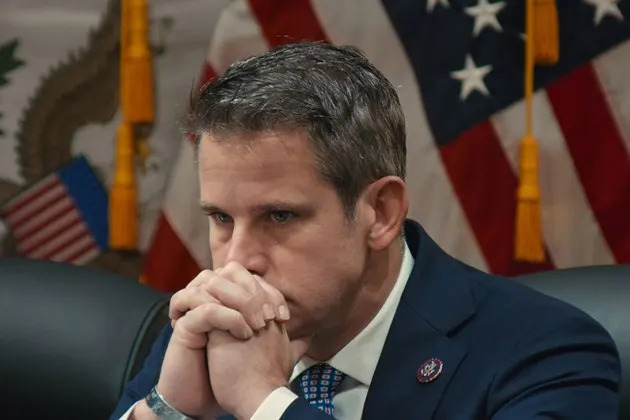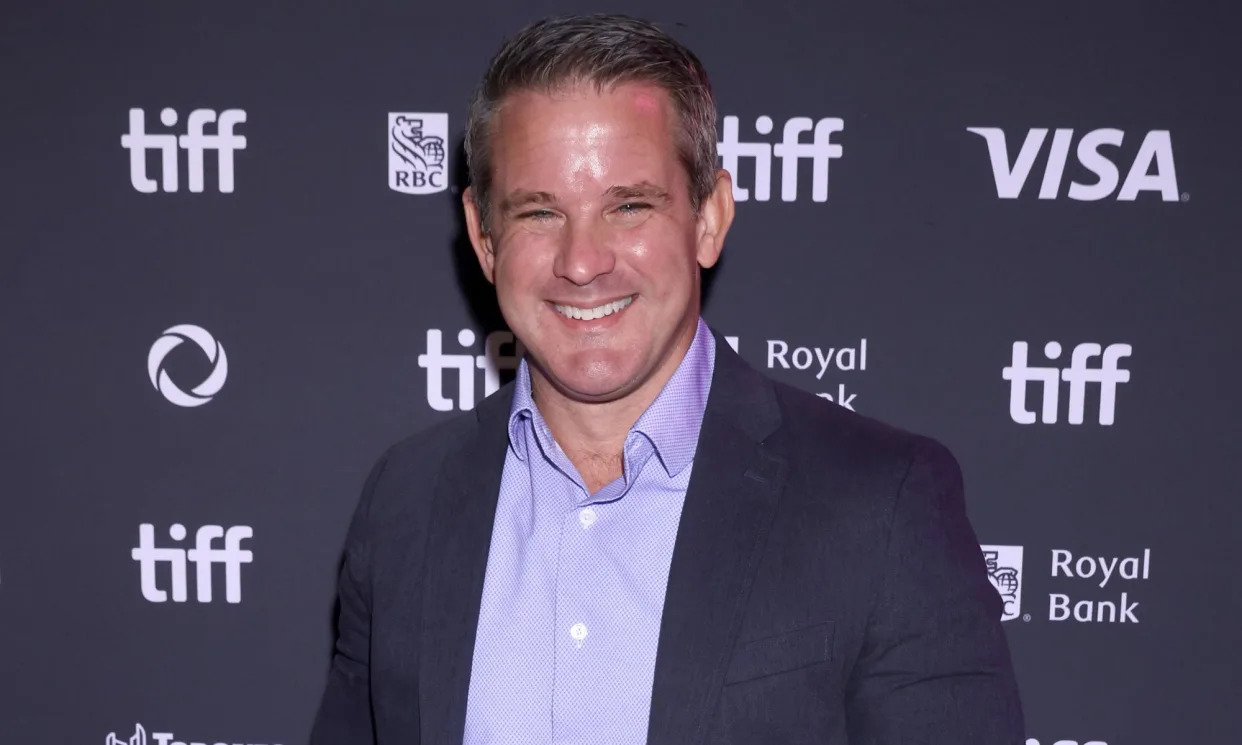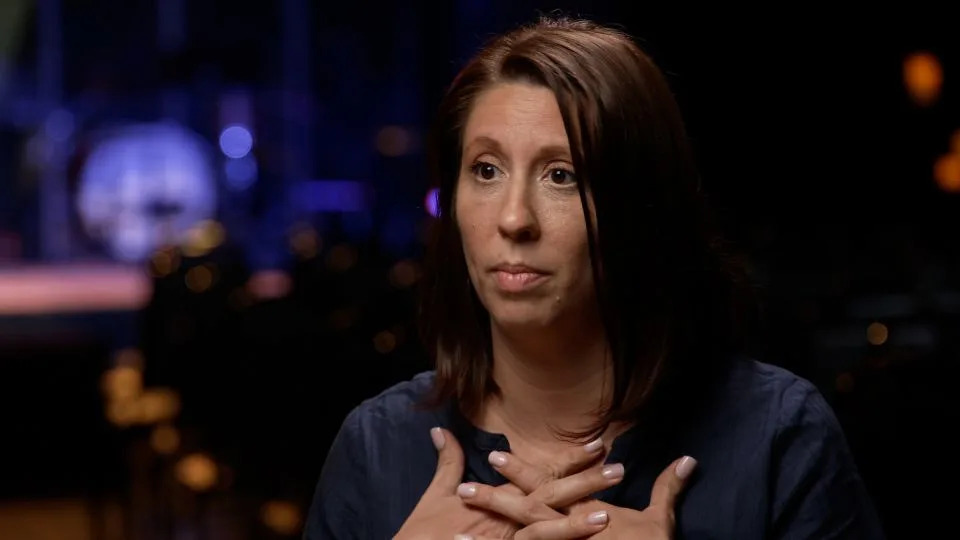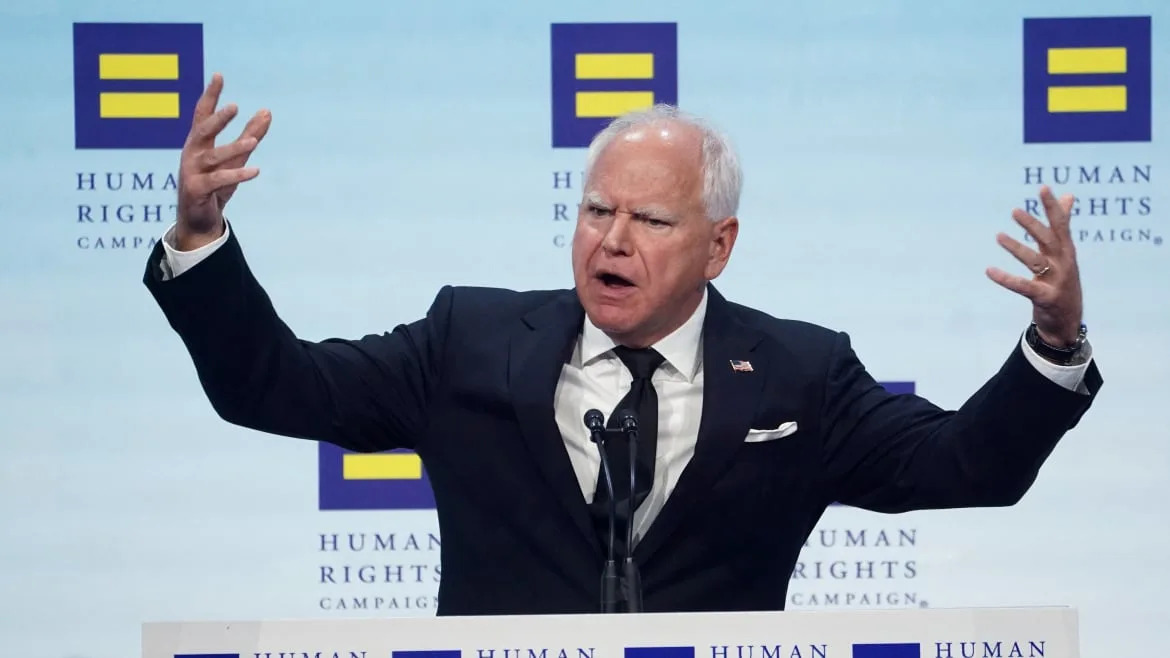Steven Zeitchik
Sat 7 September 2024

Adam Kinzinger had turned down more than a dozen requests to make a documentary. Then the director of Hot Tub Time Machine walked in.
The Illinois Republican congressman who famously — and largely solitarily — turned on Donald Trump after Jan. 6 was reluctant to participate in a movie that focused on his fading hopes to retain his seat. But Steve Pink, the aforesaid auteur of the jacuzzi, wanted to get more personal than that.
“Everyone else was interested in re-election,” Kinzinger said in an interview with THR as the Toronto International Film Festival was set to start Thursday. “But when I talked to Steve and the team their interest was in the human element — what’s the cost to you and your future kid?”
That conversation was more than two years ago. Now the resulting film, The Last Republican, could make an impact on more than just Kinzinger when it premieres at TIFF 2024 on Saturday. That film and Carville — a Telluride documentary about the maverick consultant James Carville and his long lonesome bid on the other side of the aisle to move the Democrats off Joe Biden — could thrust movies into the thick of the election. But how much are film companies interested in these stories — and will it matter in the grand voting scheme if they are?
Carville, at least, has answered the first question. CNN Films bought the movie (subtitle “Winning Is Everything, Stupid”) just before Telluride and will debut it on-air October 5 with an eye toward capitalizing on electoral interest. The Last Republican still seeks its own home when it plays for distributors this weekend, making the case that a good way to defeat Donald Trump is to popularize the backboned Republican who defied him. Submarine is handling sales on the film.
“Things are dark, Trump is still ascendant and shenanigans to call into question this year’s election seem inevitable,” Pink said in an interview. “And here’s someone who, even though his political views I abhor on a good day, lives by his beliefs in an active and tangible way. I think that will resonate with people.”
Both Republican and Carville could make a splash in the 2025 Oscar documentary race, which has seen scattered contenders but few runaway favorites. But the campaign impact could be even greater.
At a crowded screening Saturday afternoon that included a number of distribution executives, Kinzinger and the Last Republican filmmaking team took the Toronto stage to make their case.
“This is the wrong job if you’re scared to do the right thing,” Kinzinger told one questioner while also saying that the GOP has “lost its mind.”
Pink’s movie took shape when he and producer Jason Kohn, known for directing the Andre Agassi documentary “Love Means Zero” circa TIFF 2017, made their bid to Kinzinger that his story belonged on screen. And what a story it is: longtime Air National Guard pilot and conservative ideologue who spoke out against Trump’s role in January 6 and even joined the mostly Democratic Congressional commission, causing Republicans to shun him and eventually re-district him out of office.
A rapport even developed between Pink, an avowed liberal, and Kinzinger; the film suggests an odd-couple affability. “At some point this started to feel like the national Thanksgiving dinner we haven’t been able to have since 2016,” Kohn said wryly.
The filmmaker known for the temporal-shifting power of chlorine and the filmmaker who once told of tennis betrayals would not seem like obvious choices for an inside-Rayburn account. But the former’s sense of improbable story and the latter’s ability to capture a maverick serve them well. Kinzinger helps his own cause with a personality that is brash and often funny, a world away from Congressional starch even as he is facing death threats.
To MAGA Republicans Kinzinger is a Judas; to liberal Democrats he’s a martyr. But even as the 46-year-old courts attention — he did agree to the movie, after all — he says he is neither. “I’m not courageous. I’m just surrounded by cowards,” Kinzinger said in the interview, echoing a theme from the film.
For distributors, the calculus on Last Republican is a tricky one: they could buy the film now and see its value skyrocket if Trump wins. But if Trump is defeated on Nov 5, possibly for the last time, the film might be worth a lot less.
Should a distributor choose to take a flyer on a pre-election release, it could model for solidly Republican voters a way to go against Trump, depicting a man who still did so even though he paid with his career.
“Maybe I’m deluded but I think that a story can compete with Trump’s. Trump’s story is that Adam is disloyal, Adam is a RINO, Adam doesn’t represent his party,” Kohn said. “But I don’t think it’s unreasonable for a conservative audience to pick up on another story.” On Friday, Dick Cheney furthered that narrative when he added his name to the list of Republicans endorsing Kamala Harris.
A film release would also jolt viewers into recalling the attempted insurrection, depicted here in evocative detail, as well as the many mainline Republicans who quietly about-faced after first condemning Trump. (Former House Speaker Kevin McCarthy comes out particularly worse for the wear.)
A party’s dangerous groupthink is also the subject of Matt Tyrnauer’s “Carville,” which shows scene after scene from earlier in the year of its subject in vintage form, joyfully growling, cussing and eye-rolling over what he sees as the party’s dangerous deference to an unelectable incumbent. For months, that seemed to be an irrelevant message.
“It was almost a lost cause type of movie — you know, too late the hero,” Tyrnauer recalled in an interview.
The film was actually being screened for friends and family on the night of the fateful Trump-Biden debate in June. The minute the lights went on in front of Jake Tapper and Dana Bash, Tyrnauer knew he had a new ending on his hands. The film now ends with a pivot to Harris.
Still, Carville now runs the opposite risk — having been ahead of the curve for months, it could seem like old news. Carville and Tyrnauer say the movie — which also revisits its subject’s famous work on Bill Clinton’s 1992 campaign, his improbable marriage to Republican operative Mary Matalin and the generally colorful Louisiana personality always beaming from the airport TV — still carries a timeless message of both the shrewd game of politics and the nobility of public service.
But the principals also believe their film has a role to play as the campaign heats up. Tyrnauer said an explicit goal was to get it out before balloting begins, while Carville says he sees the film’s potential to influence voters’ 2024 behavior.
“I don’t know how many people watching it are going to change their vote, but maybe somebody’s gonna write 100 more postcards or maybe somebody’s gonna volunteer at a phone bank,” Carville said in an interview. “There are a thousand things people can do to get inspired. My hope is this movie inspires people to get involved with the election.”
A CNN spokeswoman, Jordan Overstreet, declined to comment on the network’s aims for the film.
The history of movies trying to shift electoral maps is a checkered one. “Fahrenheit 9/11,” Michael Moore’s blockbuster 2004 documentary that sought to get people not to vote for George W. Bush, failed in its main goal. But other modern documentaries from “Blackfish” to “Citizenfour” have succeeded in changing consciousness, and experts say that’s not hard to conceive of here.
“The idea that a filmmaker can make a difference on an election has been proven wrong — we’ve seen how that doesn’t work too many times,” said veteran documentary expert Thom Powers, who runs the doc section at TIFF. “What I think can happen is a film hits the zeitgeist in just the right way and can change how people think. The Last Republican and other films playing at this year’s festival have the potential to do exactly that.”
Kinzinger says he’s trying to keep his eye on something even bigger.
“If you fast-forward to 2124 and the administration of President Zarkon 3 or whatever we’ll call him, we’ll probably still be debating the same issues we’re debating now,” Kinzinger said. “But we can’t get there if the environment becomes one where people have lost faith in a system and even turn to violence because they think they don’t have a voice.”
The Hollywood Reporter
‘The Last Republican’ Review: Adam Kinzinger Makes an Engaging Doc Subject in Portrait of an Anti-Trump Conservative
Frank Scheck
Sat 7 September 2024

It’s a sign of the truly bizarre political times in which we live that the new documentary about former Illinois congressman Adam Kinzinger was made not by any of the usual filmmaking suspects. The Last Republican, receiving its world premiere at the Toronto International Film Festival, wasn’t helmed by, say, Michael Moore, Errol Morris, or Barbara Kopple, but rather Steve Pink. It only makes sense when you find out that one of Pink’s previous directorial efforts, Hot Tub Time Machine, is Kinzinger’s favorite film. “It’s the thing that sold me,” Kinzinger jokingly comments, well aware of the director’s ultra-liberal leanings. “You have contempt for what I believe, in terms of political viewpoints,” he acknowledges.
Now that Kinzinger has become a media personality, best-selling author, and darling of the Democratic Party (he recently spoke at their national convention), it’s easy to gloss over how much courage he displayed in standing up for democracy. Ironically, that wasn’t the reason he was forced to leave office; rather, it was a redrawing of the congressional map, one that put him in deep MAGA territory, that led him to conclude he couldn’t win a primary.
The filmmaker clearly had generous access to his subject during the intense period after the events of Jan. 6 that led him to defy the majority of his own party. “I thought, naively, that there’s no way people aren’t going to wake up from this,” Kinzinger says about that infamous day. He blames Donald Trump, sure — but he blames Kevin McCarthy, who resurrected Trump’s political fortunes with his kiss-the-ring visit to Mar-a-Lago a few weeks later, even more. After all, he points out, Trump is “nuts,” but McCarthy, a canny political operator, knew exactly what he was doing.
Kinzinger admits that he had absolutely no desire to serve on the Jan. 6 committee. “I thought, dear Jesus, not me,” he recalls, but says that he couldn’t refuse when Pelosi tapped him, only learning about it from her appearance on a Sunday morning political show. She did call him in advance, he admits, but at 5 a.m. that morning, when he was asleep.
The hearings naturally form the centerpiece of the film, with the footage inevitably feeling ultra-familiar. (Anyone interested in watching this documentary probably consumed them avidly.) But the personal comments by Kinzinger and his wife Sofia — who vividly describes her anxiety watching the events of Jan. 6 in real time and fearing for her husband’s life — prove fascinating. She says that, after the gut-wrenching testimony by several of the Capitol police officers, she texted and advised him to tell the officers that they had prevailed. He complied, tearfully comforting them, “You guys won.” Naturally, his heartfelt emotionality was mocked by the likes of Newsmax and Tucker Carlson.
Kinzinger paid dearly for his courageous acts. We hear recordings of phone calls to his office in which people threaten him and his family members in the vilest language imaginable. He received a handwritten letter from 11 family members disowning him and telling him that he had joined “the devil’s army.” And he, along with Liz Cheney, was censured by his own party. He was eventually forced to have 24-hour security at his home. “Yeah, people want to kill me,” he comments in deadpan fashion. “It sucks, right?”
Kinzinger’s less familiar backstory proves fascinating, such as the fact that he was obsessed with politics from a very early age. He once dressed up as the Illinois governor for Halloween, and even turned his bedroom into a mock campaign office. As a child, he was a Civil War reenactor. “For the North,” he’s quick to point out.
An incident from his past provides evidence that his valor began early in life. As a young man, he impulsively intervened in a late-night incident in which a man was attempting to stab his girlfriend on the street. Kinzinger was unharmed in the resulting fight, although he thinks he still suffers from PTSD as a result. There’s even surveillance footage of the harrowing event, providing the sort of cinematic emotional hook that documentary filmmakers can only dream of.
The handsome, charismatic and extremely articulate politician proves a natural camera subject (there’s a reason he’s become a television staple) and self-deprecatingly takes pains to downplay his moral stance. “I don’t believe what I did was courageous. I think it’s just that I was surrounded by cowards,” he says.
He also fascinatingly relates how, after the impeachment vote, he attempted to persuade the other nine Republican congressman who voted alongside him to join forces and try to regain control of the Republican party by taking advantage of the suspension of corporate donations and Trump’s (temporary) exile. He sorrowfully says that the others instead went silent, resulting in a missed opportunity. It goes unsaid that we may pay the price for it this November.
The Hollywood Reporter
‘We’re in a constitutional crisis’: Adam Kinzinger warns of chaos at documentary premiere
Radheyan Simonpillai in Toronto
Sun 8 September 2024

Adam Kinzinger attends the premiere of The Last RepublicanPhotograph: Brian de Rivera Simon/Getty Images
Adam Kinzinger reiterated his support for Kamala Harris in the US presidential election at the Toronto film festival on Saturday, but warned that there may be more eruptions of violence should she win.
The former Republican congressman, whose party turned against him when he voted to impeach former President Donald Trump after the January 6 insurrection, was speaking to an audience following the world premiere of The Last Republican.
The crowd-pleasing documentary, with healthy doses of comic relief in its coverage of outrageous and tragic political events, follows Kinzinger for over a year as he endures the fallout from his efforts to hold Trump accountable for inciting the riots as part of the United States house select committee on the attack. The film is a portrait focusing on the costly personal sacrifice to do what both Kinzinger and the director Steve Pink repeatedly remind is simply the right thing.
After the screening, Kinzinger said history could repeat itself at a time when his party “lost its mind” but doesn’t believe the violence will play out in exactly the same way. The battle grounds won’t be Capitol Hill, according to the politician who recently spoke during a prime slot at the Democratic national convention, but individual states.
“Look at Arizona for instance,” Kinzinger said. “Assume Arizona goes for Kamala. But it’s a Republican legislature. The legislature has to be the one to certify Kamala as the winner. I can see a pressure campaign where these people simply will not vote to certify her the winner. And what happens then? We’re in a constitutional crisis. According to the constitution, if the state legislature decides, it’s just going to certify Trump, even if its [voters] went the other way, we have to accept that in the federal government … That’s a real concern I have. You can see violence at these statehouses that don’t have the security, we have. Our security got overrun that day for God’s sakes and we have 500 times the security that state houses do.”
The Last Republican is directed by Steve Pink, a self-described leftie who Kinzinger suspects has contempt for his politics. The film opens with Pink sharing his admiration for Kinzinger’s resolute stand – he was one of ten Republicans to vote for Trump’s impeachment, and the only one next to Liz Cheney to sit on the January 6 committee. Kinzinger reciprocates, explaining that he’s agreeing to ignore the ideological gap and take part in the film because Pink directed Hot Tub Time Machine, which he loves.
Pink’s first foray into documentary is a handshake between liberal Hollywood and a Republican that occasionally leans into odd couple comedy. The director and his subject rib each other throughout for opposing political beliefs that the film shies away from interrogating. At one point Kinzinger admits his pro-life stance, but his voice wavers a bit, hinting at the slightest opening that he could be swayed. During the same interview, Pink declares: “If this documentary helps you win the presidency and you enact horrible conservative policies, I swear to fucking god!”
His profile on the extremely charming Kinzinger certainly makes the case that the kid who once dressed up as Illinois governor Jim Edgar for Halloween and grew up practically indoctrinated into Republican politics would have made a decent presidential candidate. The film revisits a heroic act, when Kinzinger, in his 20s, rescued a bleeding woman from an attacker with a knife. The act of self-sacrifice, the film gently suggests, foreshadowed his recent actions.
The Last Republican doesn’t reveal anything particularly new about January 6 and Kinzinger’s work as part of the committee, but forensically revisits the damning moments before and after the attack. Kinzinger reflects on the Republican conference call, when Speaker of the House Kevin McCarthy says he would be voting against certifying Biden’s election win. Kinzinger says he warned McCarthy on the call that such an action could lead to violence. McCarthy’s response, which can be heard in the doc, was a dismissive “Ok Adam” before he called for the “next question”.
As The Last Republican cycles through testimony, McCarthy offers personal reflections and feelings about how things happened, describing January 6 as a bad bender that the Republican party should have woken up from and sipped water to cleanse its system and recover. Instead, they backed Donald Trump. “You could always fix a hangover by starting to drink again,” says McCarthy, tying up the analogy.
Kinzinger expresses that he was angrier at his old friend Kevin McCarthy than Trump. “He’s just nuts,” Kinzinger says of the latter.
He admits he wanted nothing to do with the January 6 committee. “Please dear Jesus not me,” he would say before Nancy Pelosi announced that she would be seeking his participation without calling him first.
Following the screening, Kinzinger tells the audience that almost every Republican congressman knows the 2020 election “wasn’t stolen” and “most of them would tell you that they think Donald Trump is crazy”. He adds that before impeachment, he believed there was going to be 25 votes in favor, instead of just the 10 who did, because many were too scared to take that stand. “I would have people come up to me all the time and say ‘thanks for doing it because I’ll lose in my district if I do it, but thank you.’” He’s exasperated by the gall of it.
Kinzinger not only lost his district but was bombarded with hate while ostracized not just from his party but his own extended family. In one scene, his mother Betty Jo Kinzinger recalls a phone call from an old community friend who tells her she doesn’t like Adam anymore. “You don’t have to like Adam,” she says, “but you don’t have to tell his mother that”.
In the film, Kinzinger’s staff can be heard sorting through the relentless phone calls to his office, ranging from angry voters to terrifying threats, deciding which calls should be referred to Capitol police. The vitriol is so much that they keep a cabinet near their desk filled top to bottom with what you would think is an apocalyptic supply of Kleenex boxes. The reveal elicited a hearty laugh from the audience. But the trauma behind it is all too real.
“Over time it takes a toll that you don’t recognize on you,” Kinzinger told the audience. He said that the threats we hear in the film aren’t just a tiny sample, reciting one caller who wishes Kinzinger’s son, who was six-month-old at the time, would wander into traffic and die.
“The people that call the death threats are probably not the ones that are going to come,” Kinzinger continued, who says he was swatted just a week before, a common occurrence when he speaks out. “The ones that are going to come are not going to let you know ahead of time that they’re going to be there.”
“I would always conceal and carry,” Kinzinger continued, “not because I’m just some crazy gun guy. But that was my way to defend myself in security … You’re living with security [with] your work. You always make sure to lock the doors and arm the system at night. But after a while I realized that I’m keeping distance from people. And I don’t want to be that way.”
When pressed about why it’s so hard for his fellow Republicans to question the party line and Donald Trump, Kinzinger said that many are just clinging to what they feel is their identity.
“When you see yourself as a member of Congress,” he said, “and you walk into any room, except the White House, and you’re the most powerful person there, and you have everybody’s attention, it’s really hard to walk away from that … I’ve learned that courage is rare … you have to walk away from your identity. And unfortunately, so many in the Republican party were unwilling and are unwilling to do that.
“Since we filmed this, there have been more people elected into the Republican party that actually are batshit crazy and truly believe some of this. So that’s a scary thing.”
The Last Republican is screening at the Toronto film festival and will be released at a later date














